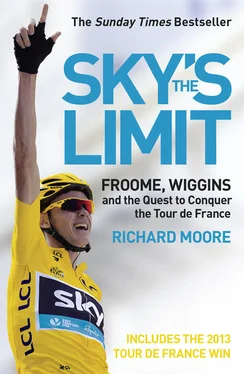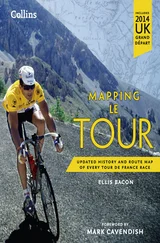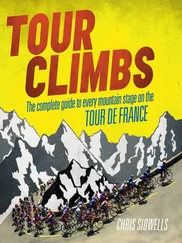On the final lap Brailsford and Sutton leapt from the bonnet of the car as though the engine had been turned on. They sprinted to the first corner, where a big screen had been set up, and they watched as Henderson and Sutton sprinted for all they were worth up the finishing straight, passing Goss, and both having time, just before the line, to look round and sit up, their hands in the air, to celebrate a fairly astonishing one-two.
Brailsford and Sutton punch the air and embrace each other, before Brailsford disappears into a huddle of journalists. But Stapleton appears and stretches over to shake hands. ‘You guys can see,’ says Stapleton, ‘I was the first to congratulate him. Congratulations, Dave, that was terrific.’
Even the languid, laidback Sean Yates is overjoyed. He high-fives the riders as they return to the car. ‘I think other teams will look at that and think, they’ve just rocked up, put six guys in a line, they looked fucking mean, and they won the race,’ says Yates.
‘Textbook,’ says Sutton. ‘But I’ve never seen Dave so stressed. With a lap to go I gave him my stress ball. He was pumping it like nobody’s business. Look, I’m here because Dave wanted me to fly over and be here. We shook hands at the start of this race, and said this is the start of the journey, but this is about other people’s expertise. They’ve done the hard yards. But being part of this,’ adds Sutton as he turns to embrace his nephew, the second-placed Chris, ‘is absolutely fantastic.’
Brailsford and Sutton also know the value of a good start to any campaign. They think back to Beijing, to day two of the Olympics, when Nicole Cooke won a gold medal in the women’s road race. It was a performance that galvanised the track team, inspired them and injected momentum, before they themselves went out and won seven gold medals. But what is most encouraging about the one-two in Rymill Park – for all that it is only a criterium; for all that it is only the hors d’œuvre to the Tour Down Under – is that it involved the execution of a plan; and that, in taking on HTC-Columbia in setting up a bunch sprint, they had beaten the world’s best exponents of this particular art.
It was encouraging. But Brailsford was more than encouraged; he was buzzing. Already aware that there had been some sniping, and lots of scepticism over his stated plans and ambitions, not least his intention to do things differently, he now hits back: ‘Some people seem to think we ride round in circles [in velodromes] and don’t know what we’re doing, but we know what lead-outs are, and we know what sprinting is about from the track.
‘Some people are saying this team’s all about marketing, flash and razzmatazz, and all the rest of it,’ he continues. ‘But we’d talked that finish through. That’s what we do. The race was predictable. Not the win, but the pattern the race would follow – a break going, and being brought back at the end. We knew what was going to happen, and that it’d come down to the last couple of laps. So you plan for that. You have to have a plan.’
And nobody could argue: day one had gone to plan.
CHAPTER 1
CRITICAL MASS
‘I thought, bloody hell, what are you supposed to do? Sit up? … This is the Tour de France – you don’t sit up.’
Bradley Wiggins
Bourg-en-Bresse, 13 July 2007
It had been a typical flat, early stage of the Tour de France. Typical, that is, unless you happened to be British.
Stage six, 199.5km from Semur-en-Auxois to Bourg-en-Bresse, rolled through flat but beautiful Burgundy countryside, past golden fields, sprawling stone farms and proud châteaux. But amid the usual flurry of attacks in the early kilometres, from riders eager to feature in the day’s break, one man went clear on his own.
He was up near the front of the peloton, ideally positioned for the waves of attacks. He followed one of those accelerations, then looked around to see that he had four riders for company, with daylight between them and the peloton. A gap! Perfect. And so he put his head down, tucking into a more aerodynamic position, and pressed hard on the pedals, making the kind of effort that had propelled him to his Olympic and world pursuit titles. When he turned around again he saw that he was alone. He wasn’t sure what had happened, whether his companions had been dropped or given up. And he wasn’t sure what to do. So he kept going.
Bradley Wiggins, riding for the French Cofidis squad, carried on riding alone, elbows bent, beak-shaped nose cutting through the wind, long, lean legs slicing up and down to a relentless beat, for kilometre after kilometre after kilometre. While the peloton ambled along behind him, content to let the solitary rider up front flog himself, the Englishman built a lead that stretched to an enormous 16 minutes. At that point there was around 9km, or 6 miles, between him and the others. It was an unusual way to do it. And it was probably doomed to failure. But Bradley Wiggins was finally making his mark on the Tour de France.
The previous year, when the then 26-year-old Wiggins had finally ridden his first Tour, he was one of only two British riders in the race, the other being David Millar, returning from a two-year suspension for doping. Wiggins seemed like a square peg in a round hole. He was the Olympic pursuit champion, a track superstar and a road nobody. For five seasons, since turning professional with the Française des Jeux team as a raw 21-year-old in 2002, Wiggins had drifted around some of the most established, most traditional teams in the peloton – from FDJ to Crédit Agricole – before moving on to a third French outfit, Cofidis, in 2006.
To observers, road racing seemed more like a hobby than a profession. It was what Wiggins did when he wasn’t preparing for a world championship or Olympic Games. He was fortunate to be in teams that indulged him in his track obsession; or perhaps they just didn’t care, and could afford to write off his salary – starting at £25,000, rising to £80,000 – or regard it as a small investment in the British market. Although any interest his teams’ sponsors – the French national lottery, a French bank and a French loans company – had in the British market must have been, at best, negligible.
Most mornings during his first Tour, Wiggins would leave the sanctuary of his team bus. He would swing his leg over his bike and weave through the crowds to the signing-on stage. Then he would head for the Village Départ, where entry is restricted to guests, VIPs, accredited media and riders – though in the era of luxury team buses, few riders deigned to appear. Wiggins was different. He liked to read the British newspapers and drink coffee with British journalists in the Crédit Lyonnais press tent.
About halfway through his debut Tour, as he waited one morning in the Village Départ for his wife, Cath, who was over to visit, Wiggins was asked how he was finding the race. ‘Um, I think I can win this thing,’ he said. He missed a beat before cracking a wry, self-deprecating smile. The idea was ridiculous. It confirmed his image – and indeed his self-image – as an outsider.
Not that he was a disinterested outsider. Wiggins’ knowledge of the Tour de France, his respect for it, and his awe of its champions, was obvious; he just didn’t seem to understand what he, Bradley Wiggins, was doing there, or what, if anything, he could bring to the party. Rather, he resembled an English club cyclist parachuted into the biggest race in the world; he seemed oblivious to, or in denial of, his talent.
On another occasion Wiggins sat drinking coffee and reading the papers a little too long. One of his Cofidis directors came hurrying over, shouting: ‘Brad! Allez!’ The race had left without him. Amid scattered newspapers and upturned cups of coffee, Wiggins shot up, grabbed his bike, pedalled hastily across the grass and bumped on to the road just in time to join the tail end of the vast, snaking convoy of vehicles that follows the race, working his way through that and finally into the peloton to survive another day. After three weeks he finished 123rd in Paris. But to the extent that any rider who finishes the Tour can do, he left no discernible trace.
Читать дальше












